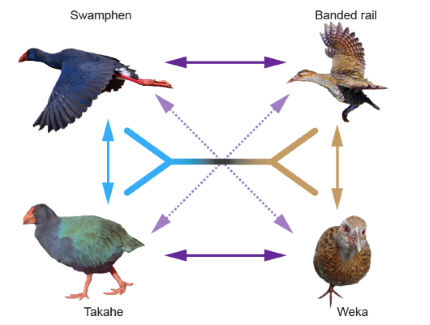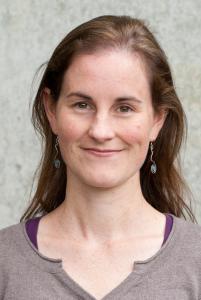Why fly when you can walk?

Possible comparisons between flighted and flightless New Zealand rails. Image Steve Trewick
Posted: Thu, 3 Nov 2016
Birds are the quintessential flying machines. But flying costs energy. Flying also constrains body size, weight, reproduction and shape. So if you don’t have to fly, why bother?
Not surprisingly, some birds have given up flight altogether. However, some lineages appear more prone to flight loss than others. This might be because physiological and/or ecological traits are limiting. For example, there are no flightless hummingbirds!
Dr Gillian Gibb, from Massey University in Palmerston North, has been awarded a Marsden Fast-Start grant to investigate the genetic mechanisms underlying the pathways to flightlessness. She will use genetic techniques to explore the well-studied ecological and physical differences between related flightless and flighted birds.
Many of New Zealand’s endemic birds have evolved flightlessness, sometimes independently, but this research will focus on birds in the rail family. Rails are an ecologically and culturally significant part of New Zealand’s bird fauna, and contain the flightless weka and takahē. Dr Gibb plans to compare pairs of two closely-related species of rails – in each pair, one can fly and the other cannot. The flightless weka will be compared to the flighted buff-banded rail, and the flightless takahē to the pukeko.
Dr Gibb will use comparative genomics analyses to reveal whether a conserved set of genes are implicated in the development of flightlessness, and will also investigate what order, timing and degree of variability there is in the combination of genes operating in different birds.
This research will enhance our understanding of many important genetic pathways, including limb development, reproductive capacity, immunology and metabolism. The knowledge gained will have application in many other species and provide new insights into the molecular foundation of a profound ecological and evolutionary shift.

Dr Gillian Gibb, Massey University
Total Funding: $300,000 (excl. GST) over 3 years
Researchers: Dr Gillian Gibb, Institute of Agriculture and Environment, Massey University, Private Bag 11 222, Manawatu Mail Centre, Palmerston North 4412
